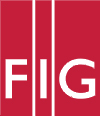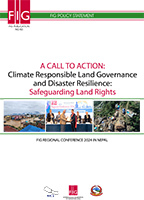| |
FIG PUBLICATION NO. 83
A CALL TO ACTION:
Climate Responsible Land Governance
and Disaster Resilience:
Safeguarding Land Rights
FIG Regional Conference 2024 in Nepal
FIG POLICY STATEMENT
Editors:
Clarissa Augustinus, Ganesh Prasad Bhatta, Tina Baidar, Sanjeevan Shrestha
Contributing Authors:
Paula Djikstra, Raja Ram Chhatkuli, Hellen Nyamweru-Ndungu
FOREWORDS
Foreword by FIG President Diane Dumashie:
This FIG Nepal CALL TO ACTION on Climate Responsible Land Governance and
Disaster Resilience underscores the imperative for land professionals to act
in a climate responsive way. The publication is
an outcome of the deliberations at the FIG Regional Conference in Katmandu,
Nepal, November 2024. It highlights that Climate Change has a huge impact on
vulnerable populations and landscapes, such as in the mountainous regions of
Nepal.
The publication presents the conference purpose and the emerging global
to local cooperative efforts seen within our survey community. It is a
milestone FIG document on Climate Action demonstrating our purposeful
articulation and contribution to the greatest challenge we face as land
professionals.
Climate action is a key focus of the FIG Work Plan 2023–2026 and the FIG
Vision to ‘serve and leave no-one behind.’ It is not enough to be
sustainable … we need to also be resilient. As a profession we need to act
together to generate knowledge and climate resilient land for people and the
planet. For this reason, we created the FIG Climate Compass Task Force to
steer us and chart our way forward. With support from all FIG Commissions,
we increase our knowledge, skills and tools to adapt and mitigate climate
change.
This CALL TO ACTION, as agreed at the conference, includes practical
strategies for all land professionals to address climate change and provide
disaster resilience. A significant outcome of the conference was the
creation of a collaborative Asia regional partnership linked to the CALL TO
ACTION. In this regard some resolutions focused on bridging regional gaps in
practical knowledge, capacity implementation, resources and coordination.
Surveyors are a crucial bridge between environmental policy and practice.
This will be best achieved by informing and working with partners. We need government
led solutions which go to scale. The industry work force needs to be scaled
up and young surveyors are the key to our role as a profession delivering
solutions. We can innovate with new technology that facilitates scenario
development on climate change and action to guide decision makers. We can
demonstrate how important it is to integrate climate geospatial data,
including geo-earth observations, with land administration systems. All this
work must be shaped by our professional ethics and standards. We must work
collaboratively and in partnership with climate stakeholders and other
experts. Land rights must be safeguarded, including the rights of vulnerable
people while, at the same time, supporting adaptation and mitigation
measures.
We acknowledge those who made this conference a success through the power
of partnerships. This includes the Nepal Institution of Chartered Surveyors
and Nepal’s Ministry of Land Management, Cooperatives and Poverty
Alleviation. We strongly recognise the role of Ganesh Prasad Bhatta, Joint
Secretary of the Ministry, who was ably supported by a large local team,
including Tina Baidar and Sanjeevan Shrestha, and many more too numerous to
name. Thanks also goes to FIG global partners from the World Bank,
supporting the conference with a multiple session programme, and to the
support and contributions of UN-Habitat/Global Land Tool Network, as well as
ideas and programme input from Kadaster International. Our grateful thanks
for the efforts of Dr. Clarissa Augustinus, Co-chair of the Climate Compass
Task Force, as the lead author and coordinator for this publication.
It is our hope that this CALL TO ACTION will resonate and inform the FIG
global community, and that the knowledge will be widely applied throughout
the world and especially in vulnerable countries. The future we want
supports the United Nations SDG global agenda. It is about ‘People’ – the
responsible governance of tenure; ‘Partnerships’ – global to local; ‘Peace’
– human rights and equity; our ‘Planet’ – addressing the impact of climate
change and natural disaster; and ‘Prosperity’ – economic growth,
livelihoods, jobs, land and property.
Through the work of the organising team, the unwavering support of our
global partners and the knowledge sharing, and openness to new ideas from
our delegates, we successfully held an Asian regional conference on climate
producing this publication and a CALL TO ACTION.
Diane A Dumashie,
FIG President (2023–2026)
Foreword by
Co-Conference Director Ganesh Prasad Bhatta
It is with great pride and heartfelt gratitude that we present this
publication, a remarkable outcome of the successful FIG Regional
Conference 2024 held in Kathmandu, Nepal. This event, hosted by the Nepal
Institution of Chartered Surveyors (NICS), under the prestigious banner of
the International Federation of Surveyors (FIG), marked a pivotal milestone
for our country and the region. The realisation of such a largescale event
has been a long-cherished dream, reflecting our collective determination and
collaboration.
The theme of the conference, ‘Climate-Responsive Land Governance and
Disaster Resilience: Safeguarding Land Rights,’ was chosen with the aim of
addressing some of the most urgent challenges we face today. Climate change
and natural disasters pose significant threats to land rights and societal
resilience. This publication encapsulates the knowledge, insights, and
innovative solutions shared during the conference, aiming to promote
climate-responsive land governance and inspire actions that foster resilient
communities. We are confident that the contributions compiled here resonate
that vision and provide valuable guidance for advancing these critical
objectives.
This publication stands as a testament to the meaningful partnerships and
collaborations fostered during the conference. Over 280 participants from
more than 30 countries – including national and regional institutions,
academics, professionals, governments, development partners, NGOs, non-state
actors, and private sector representatives – came together to exchange
knowledge, ignite dialogue, and facilitate technology transfer. The
conclusion of the event with a CALL TO ACTION was a powerful outcome
intended to guide government agencies, professional organisations, and
stakeholders in aligning their efforts with the conference’s objectives.
As we reflect on the success of this event, we are reminded of the Nepali
principle of “Atithi Devo Bhava” or “The Guest is God.” We endeavoured to
extend our warmest hospitality to all participants and hope that the vibrant
culture, rich history, and natural beauty of Kathmandu left a lasting
impression. For our Nepali attendees, we trust this event provided
invaluable opportunities to expand professional networks and gain fresh
perspectives on the pressing issues at hand.
We extend our deepest gratitude to FIG for entrusting us with the
opportunity to host this conference in Nepal. We are equally thankful to our
co-organisers, partners, sponsors, esteemed speakers, and distinguished
participants for their generous support and contributions, which made this
event possible. Most importantly, I would like to take this opportunity to
extend heartiest thankfulness to some of the imminent personalities for
their support including Mr. Tirtha Bahadur Pradhanang, the President of
NICS, for trusting me to lead the local organising committee. I also want to
thank Dr. Diane Dumashie, the President of FIG for her visionary leadership
and inspiring contributions, and my counterpart Ms. Louise Friis-Hansen, the
FIG Director and Co-conference Director for her hard work and guidance
throughout successful completion of the event. Dr. Clarissa Augustinus, who
extraordinarily contributed to the success of the event, by leading the
publication and technical aspects. Ms. Paula Dijkstra, the Director of
Kadaster International, for her instrumental role in shaping this event
despite being unable to attend the event in person. Mr. Janak Raj Joshi, the
Executive Director of the Land Management Training Center, for hosting the
pre-event of the Young Surveyors’ meeting. Ms. Tina Baidar and Mr. Sanjeevan
Shrestha for their tireless efforts during the event, and all those who have
contributed in one way or another. This event would not have been successful
without the continued support and encouragement of the Government of Nepal,
particularly the Ministry of Land Management, Cooperatives, and Poverty
Alleviation, under the distinguished leadership of Honourable Minister Mr.
Bala Ram Adhikari and Secretary Mr. Arjun Prasad Pokharel. I extend my
highest regards and sincere appreciation to them.
This publication is more than a record of the event, it is a resource for
continued learning and a CALL TO ACTION. We hope it serves as an enduring
source of inspiration for advancing climate-responsive land governance and
building resilient communities. May it inspire innovative ideas, enduring
partnerships, and meaningful progress in the years to come.
Ganesh Prasad Bhatta
Chair, LOC / Co-Conference Director / FIG Representative-NICS
Executive Summary
This International Federation of Surveyors (FIG) Regional Conference on
‘Climate responsive land governance and disaster resilience: safeguarding
land rights,’ focused on South Asia, was held in Kathmandu, Nepal from the
14–16 November 2024. The conference was hosted by the Nepal Institution of
Chartered Surveyors (NICS), the sole member association of FIG from Nepal.
The World Bank was a key partner organisation in the conference. As part of
the conference a workshop on ‘Land Use Planning in Nepal: Opportunities,
Challenges, and Prospects’ was organised by the World Bank in partnership
with the Ministry of Land Management, Cooperatives and Poverty Alleviation
(MLMCPA) and FIG. The conference addressed the most challenging issue of
our time, the climate crisis which is affecting all the countries in the
region. Because of the importance of climate change to the global community,
FIG decided to examine and actively promote the engagement and role that
surveyors can have in contributing to the climate change agenda. The
conference was a major milestone in achieving the FIG vision on rethinking
the way climate challenges are addressed, thus enabling FIG to support the
achievement of the 2030 Sustainable Development Goals (SDG) Agenda. Climate
underpins the FIG Council’s vision of sustainability over the term
2023–2026. The conference demonstrated that the expertise of surveyors means
they are well positioned to make a major contribution to addressing a wide
range of climate change issues. The Conference provided an opportunity for
networking, learning, providing practical knowledge and actionable
recommendations about how surveyors and land practitioners can address
climate and disaster in the region, also for vulnerable populations. This
was done through a focus on 4 thematic areas: 1) Climate responsive land
governance; 2) Natural disaster resilience for communities, professionals
and organisations; 3) Cooperation and partnerships to safeguard land rights;
and 4) Capacity development for communities, professionals and
organisations. Three thought provoking inaugural and plenary sessions and
numerous technical sessions provided an opportunity to present and reflect
on good practices, lessons learnt and shared experiences on the critical
role of surveyors and land practitioners in addressing the pressing
challenges of climate change. The conference achieved its two main
objectives. The main objective was to build knowledge and capacity in the
region to address climate change and disaster-induced challenges in
safeguarding land rights of vulnerable groups, emphasising the critical role
of land governance and resilience. The second objective was to foster
collaborative partnerships among national and regional institutions,
academics, and professionals to facilitate knowledge sharing and technology
transfer at the regional level, and to build FIG’s presence in the region.
Integral to these objectives was the adoption of a CALL TO ACTION. This was
based on the innovative regional and national thinking presented at the
conference, including a range of pioneering actions to address climate
change and natural disasters. These actions are useful for governments,
professionals, academics and NGOs.
Chapters
The Call to Action
Introduction
Key global perspectives and main messages
Some highlights from the technikcal sessions
Conclusions and summary
Read the full FIG Publication 83 in pdf
Copyright © The International Federation of Surveyors (FIG),
February 2025.
All rights reserved.
International Federation of Surveyors (FIG)
Kalvebod Brygge 31–33
DK-1780 Copenhagen V
DENMARK
Tel. + 45 38 86 10 81
E-mail: FIG@FIG.net
www.fig.net
Published in English
Copenhagen, Denmark
ISSN 1018-6530 (print)
ISSN 2311-8423 (pdf)
ISBN 978-87-93914-19-3 (print)
ISBN 978-87-93914-20-9 (pdf)
Published by
International Federation of Surveyors (FIG)
Layout: Lagarto
|
























